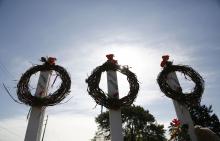sikh gurudwara shooting

Few can know what goes through the twisted mind of a mass killer, but Wade Michael Page left behind plenty of signs that he was consumed by one thing: hate.
Page, 40, was identified by police Monday as the gunman who killed six worshippers Sunday morning at a Sikh temple here. Local and federal authorities said they were investigating whether the shooting was an act of domestic terrorism.
The bald, heavy man decorated in tattoos and shot dead in an exchange with police played in hate bands and used hate-filled heavy-metal music to recruit white supremacists to the cause.

Law enforcement authorities don't know why suspected gunman Wade Michael Page burst into a Sikh temple in Oak Creek, Wis., on Sunday and opened fire, killing six before he was shot dead by the police.
But many American Sikhs say they do know this: Their community has been targeted by a growing number of hate crimes since the 9/11 terrorist attacks. The New York-based Sikh Coalition reports more than 700 such incidents since 2001. The question is: Why?
"The turban is the main issue here," said Pashaura Singh, a professor of Sikh and Punjabi studies at the University of California-Riverside. "People confuse Sikhs with Osama bin Laden."
Following 9/11, bin Laden and his al-Qaida associates were often shown in media reports wearing white turbans. Combine that with a lack of basic knowledge about the estimated 500,000 Sikhs living in the U.S. and you get tragic — and sometimes violent — cases of mistaken identity.